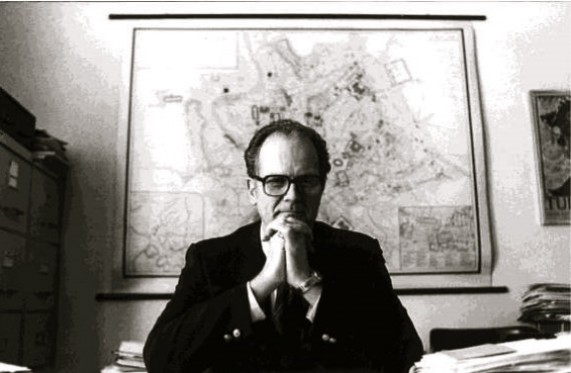Charles Luther Babcock
1924-2012
Not even his heroic combat experience as a Captain of infantry in the European Theater of Operations in World War II (for which he was awarded the Bronze Star with a Valor device) could dampen Charles Babcock’s love of Italy and the sites of Roman literature and histo ry.
ry.
Born on 26 May 1924 in Whittier, California, to Robert Louis and Margarette Estelle Fuller Babcock, Charles interrupted his undergraduate career at the University of California at Berkeley by enlisting. After being demobbed in 1947 after serving as an aide to Gen. Jon B. Coulter, this California native returned to Berkeley where he completed his received the A.B. in 1948 and the
M.A. one year later. He served as an assistant in classics at the University of Utah from 1949 to 1950, when he returned to Berkeley to receive the Ph.D. in 1953. From 1953 to 1955 he was a Fulbright Scholar and Fellow at the American Academy in Rome. Upon his return, he married Mary Ayer Taylor on 6 August 1955 before assuming a position as instructor in classics at Cornell, with a stint as acting instructor at Stanford in the summer of 1956. Leaving Cornell in 1957 he became assistant professor at the University of Pennsylvania, then associate professor in 1962. He developed his skills as an administrator first as assistant dean (1960-62), then as vice dean (1962-64) and acting dean (Spring 1964) of the College of Arts and Sciences (1960-62).
In 1966 he moved to Ohio State as professor of classics (1966-92) and chair of the department of classics (1966-68, 1980-88) before relinquishing his chairmanship to become the first dean of the College of Humanities (1968-70). Charles managed a number of executive and administrative positions with exceptional grace and goodwill, including stints as director of the APA (1968-72), chairman of the Latin Examination committee of the Advanced Placement Examination (1972-74), professor-in-charge of the Intercollegiate Center for Classical Studies in Rome (1974-75), and chair of its managing committee following the death of its founder Brooks Otis (1975-82), president of the Vergilian Society of America (1975-76), president of CAMWS (1977-78), and president of the Association of Departments of Foreign Languages (1986). By far the association that gave him the most pleasure involved his beloved American Academy at Rome, where he was professor-in-charge of the summer school (1966), trustee (1981-83), resident in classical studies (1986), and acting Mellon Professor-in-Charge of the School of Classical Studies (1988-89).
Throughout his long and distinguished career as teacher, scholar, and administrator, he never ceased to share his enthusiasm for Rome with students in his classroom and especially on site. His personal warmth and administrative ability successfully served not only the Intercollegiate Center and the American Academy, but the members of his profession as a whole, where he was as helpful to junior members as he was unfailingly collegial with senior members. His distinguished career was recognized in 1982 by a CAMWS Ovatio. His service to Ohio State resulted in numerous awards, including the Alfred Wright Award (1968), the first College of Humanities Exemplary Faculty Award in 1989 (now called the Babcock Award), and the Distinguished Service Award (1996). Perhaps the finest recognition of Charles Babcock’s devotion to sharing his love of Rome and Roman sites was the establishment by Ohio State of a scholarship in his name to support students studying in Italy.
Charles Babcock died on 7 December 2012 in Columbus, Ohio.
— Ward Briggs
